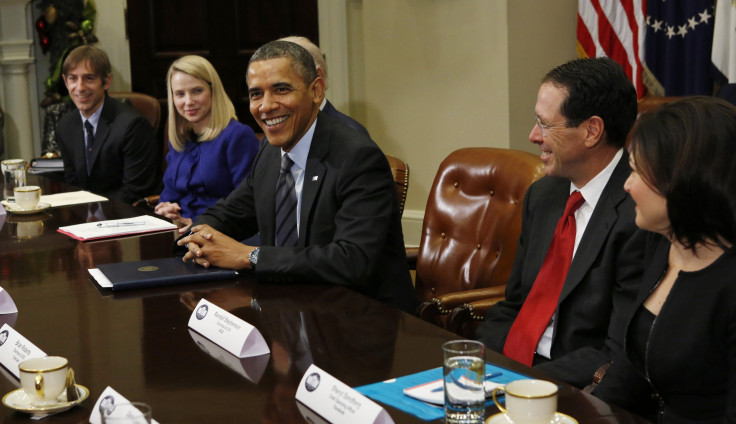Who's Visiting The White House? Companies Whose Execs Meet With The President Enjoy Major Perks

Donald Trump’s White House plans to keep its visitor logs hidden from the public eye, and that decision might amount to more than a simple transparency issue, according to a new study published in the National Bureau of Economic Research this week.
Using data from the administration of former President Barack Obama stretching from 2009 to 2015, researchers from the University of Illinois at Urbana-Champaign linked company leaders’ White House visits to higher prior campaign contributions, rises in their firms’ stock prices, greater regulatory relief and more government contracts. The study, which excluded follow-up visits and meetings of more than 50 participants, also provided a possible insight into why some companies’ share prices sank in the wake of Trump’s surprise election victory last year.
“Using the 2016 presidential election as a shock to firms’ political access, we find that firms with access to the Obama administration deliver significantly lower stock returns following the release of the election result than otherwise similar firms that do not have access,” the authors noted. “Overall, our results provide evidence suggesting that political access is of significant value to corporations.”
Of the 2,286 meetings between executives and federal officials included in the study, the most frequent visitors were Honeywell International Chairman and then CEO David Cote, with 30 meetings; General Electric CEO Jeff Immelt, with 22; and Roger Altman, founder and former executive chairman of the investment banking firm EverCore Partners, with 21.
The study authors could complete their work only because the previous administration granted access to its visitor logs — a tradition Trump’s administration has broken with altogether.
So far, Trump has convened White House meetings with executives in the manufacturing, tech, trucking, pharmaceutical, health insurance, retail and banking industries. His business advisory group, chaired by Stephen Schwarzman, the CEO and chairman of the private equity firm Blackstone Group, included the CEOs of General Motors, IBM, PepsiCo, Wal-Mart, Boeing and JPMorgan Chase, among others.
Democrats have pushed twin bills in the House and Senate seeking to mandate that Trump disclose who visits not only the White House, but other Trump estates where the former reality TV star meets with diplomats and corporate leaders, such as Trump Tower and the Palm Beach, Florida, Mar-a-Lago estate — commonly dubbed the “Winter White House.” The nonprofit Citizens for Responsibility and Ethics in Washington, or CREW, along with Columbia University’s Knight First Amendment Institute and the National Security Archive, a non-profit foreign policy research institute, sued the Department of Homeland Security in April over the White House’s failure to disclose visitor records.
“We hoped that the Trump administration would follow the precedent of the Obama administration and continue to release visitor logs, but unfortunately they have not,” said CREW’s executive director, Noah Bookbinder, in a press release announcing the April 10 lawsuit. “Given the many issues we have already seen in this White House with conflicts of interest, outside influence and potential ethics violations, transparency is more important than ever, so we had no choice but to sue.”
Obama announced in September 2009 after similar litigation that his White House would begin posting visitor logs online.
© Copyright IBTimes 2025. All rights reserved.






















